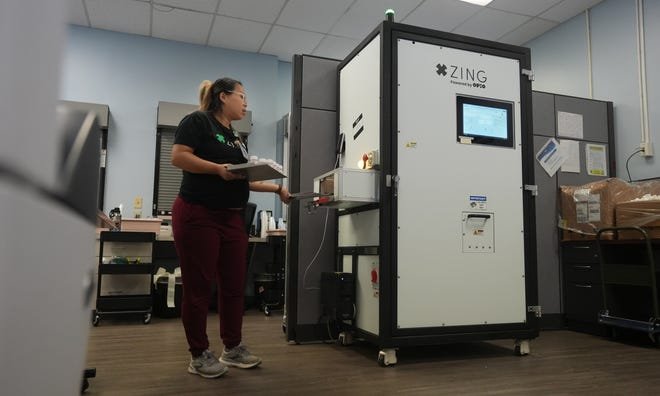“We’re coming out of the shadows through CompDrug,” said Mike Pokorny, co-founder and vice president of engineering at Opio.
The partnership began at an industry conference in November when CompDrug CEO Dustin Mets met with Opio’s team and learned about the machine. At the time, the Mets recalls feeling bad because he and his team dominated Opio’s time.
But Pokorny said it was the Mets’ intransigence about whether Zing was the right fit for CompDrug that ended up making the partnership happen.
After Opio’s team visited CompDrug in January, they knew it was the right place for the first Zing machine, Pokorny said.
“It’s cohesive,” he said of the CompDrug team and the culture where he said every voice is heard. “It’s warm.”
“Pressure testing” Zing in a real environment where it would be used is allowing Opio’s team to refine the product for other clinics around the country, Pokorny said.
There are five other opioid treatment programs slated to get the machine made in Wisconsin soon, from Baltimore to San Diego.
Columbus Conversations: “What is the state of the opioid crisis in our community?”
To ‘help nurses be nurses’
The machine has reduced the amount of nurses needed at the window to greet patients each day, said Tawnya Tucker, director of nursing at CompDrug, who hopes the machine will mean more nurses can lead health education teams for patients.
This is an important change considering the current shortage of nurses.
About 94 percent of registered nurses surveyed said there was a “severe or moderate shortage of nurses in their area,” according to a 2023 survey of more than 18,000 nurses by AMN Healthcare, a healthcare personnel company.
And they just expect it to get worse.
Opio’s mission is to enable opioid treatment programs to reach smaller communities, Pokorny said, and the company hopes Zing can help make that happen.
“There are patients in virtually every community in the country,” she said, but cost and a shortage of nurses keep programs of care from going anywhere. “This is the first stepping stone.”
Opio was founded in January 2021 by Pokorny and Amber Norbeck, after they realized there were areas in Montana where it was difficult for programs to extend their services. Statewide, there are only four programs, all of which put the burden on the patient to get the drugs, something Opio wants to change.
“It takes technology to do that,” Pokorny said. “The machine adds flexibility and different workflows.”
Nurses also reported high levels of stress in the AMN survey, with four out of five saying they experience a lot or a lot of stress. More nurses responded to the 2023 survey saying they are concerned about their job affecting their health and feel emotionally drained than in the 2021 survey.
It’s difficult, Mets said, because nurses can’t get methadone dosing and labeling wrong, but they also have to diligently pay attention to the patient on the other side of the window. Both are life and death, she said.
“It’s stressful because you constantly have to switch contexts between the two,” the Mets said.
Because of the stigma around addiction, there hasn’t been much innovation in the opioid treatment space, Mets said.
Thus, Zing is “revolutionary”.
“I would highly recommend they (other opioid treatment programs) bring in Zing to help with the workforce, help with patient satisfaction,” she said. “To help nurses be nurses”.
dking@dispatch.com
@DanaeKing
